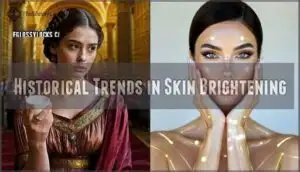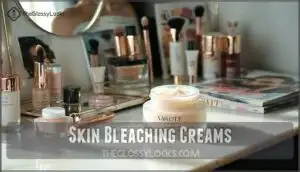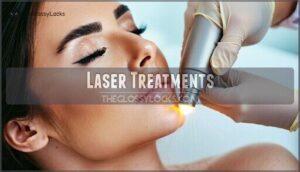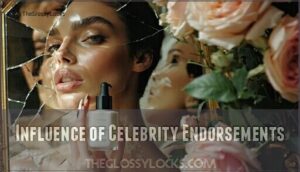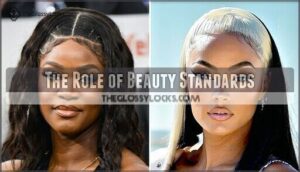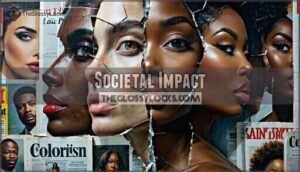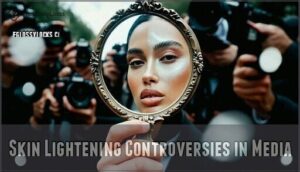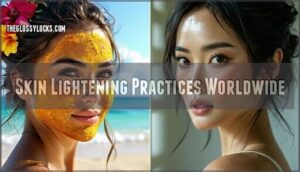This site is supported by our readers. We may earn a commission, at no cost to you, if you purchase through links.
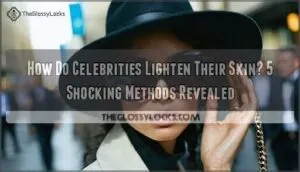 In the context of skin lightening, celebrities often rely on high-tech procedures and carefully chosen products.
In the context of skin lightening, celebrities often rely on high-tech procedures and carefully chosen products.
Glutathione injections are a favorite—they’re antioxidant-packed and believed to brighten skin from the inside out (though the science isn’t fully backed).
Skin bleaching creams with ingredients like hydroquinone are another go-to, but they come with potential health risks.
Laser treatments? Definitely on the list, targeting dark spots and uneven color like a high-tech eraser.
It’s all tied to beauty standards that many find hard to ignore.
Curious about the cultural impact, or what’s next for skin lightening? There’s more to this story!
Table Of Contents
- Key Takeaways
- How Do Celebrities Lighten Their Skin?
- Celebrities & Skin Lightening: Overview
- Historical Trends in Skin Brightening
- Common Methods Used by Celebrities
- Influence of Celebrity Endorsements
- The Role of Beauty Standards
- Skin Lightening Challenges
- Skin Lightening Controversies in Media
- Public Perception & Cultural Influence
- Skin Lightening Practices Worldwide
- The Future of Skin Brightening Trends
- Frequently Asked Questions (FAQs)
- What do celebs use to lighten their skin?
- What do actors do for skin lightening?
- How did Beyonce lighten her skin?
- How do celebrities lighten their skin permanently without?
- What do celebrities use to brighten their skin?
- What are black celebrities using to lighten their skin?
- How do actors whiten their skin?
- How do people lighten their skin?
- How long does celebrity skin lightening typically last?
- Are there any natural alternatives to chemical skin lighteners?
- Conclusion
Key Takeaways
- Celebrities often use glutathione injections, bleaching creams with hydroquinone or kojic acid, and laser treatments to lighten skin, but all come with risks.
- Treatments like chemical peels and antioxidant-packed serums are popular for brightening skin while maintaining a smoother tone.
- Skin lightening practices are tied to societal pressures and beauty standards, sparking debates over ethics, health, and colorism.
- Always research thoroughly and consult a dermatologist before considering any skin-lightening method to avoid long-term harm.
How Do Celebrities Lighten Their Skin?
In the context of celebrity skin lightening, the methods can be as dazzling as they’re concerning.
You might’ve heard of glutathione injections, hyped for delivering quick, dramatic results—though the health risks aren’t exactly small talk.
Then there are skin bleaching creams with hydroquinone or kojic acid, popular yet sneaky culprits behind skin damage.
High-tech solutions like lasers or chemical peels deliver noticeable changes but aren’t without side effects.
Some celebs stick to safer but slower topical creams.
But here’s the kicker—this isn’t just about skincare.
Psychological impact, unrealistically high beauty standards, and ethical implications all swirl around celebrity skin lightening.
The glow-up might actually dim deeper issues.
Celebrities & Skin Lightening: Overview
In the context of celebrity skin lightening, there’s more than meets the eye.
Stars don’t just wake up with a glowing complexion; their reasons for altering skin tone often vary.
Motivations explored include fitting industry beauty standards or managing public image under media scrutiny.
While some embrace natural enhancements, others lean into advanced treatments cloaked in industry secrets, sparking ethical implications.
Skin lightening techniques have grown sophisticated, but they still face criticism for reinforcing outdated ideals.
Here’s what drives celebrities to seek these changes:
- Addressing hyperpigmentation or uneven skin tone.
- Meeting societal expectations often promoted by Hollywood.
- Pressure from media scrutiny and relentless public image demands.
- Influence of celebrity skincare trends or endorsements.
- Personal experimentation fueled by curiosity or aesthetic goals.
Historical Trends in Skin Brightening
Skin lightening has a fascinating, though complicated, history.
For centuries, lighter skin was seen as a mark of privilege and sophistication, tied to ancient beauty ideals.
Back then, staying pale meant you didn’t toil under the sun, hinting at wealth and nobility.
This "nobility association" reinforced a hierarchy where fair skin came to symbolize status.
As time passed, these beliefs fueled colorism origins—dividing communities by favoring lighter hues.
Through colonization and cultural exchanges, these ideals underwent a global spread, embedding themselves into diverse societies.
Evolving techniques also emerged, from lead-based powders in Rome to rice water in Asia, all aiming to illuminate the skin.
Today’s trends, including skin bleaching, owe much to these historical influences.
While the intent may have shifted—tackling dark spots or hyperpigmentation—the underlying beauty standards remain rooted in history.
Celebrities now embody this ongoing narrative, both perpetuating and reshaping it.
Common Methods Used by Celebrities
If you’ve ever wondered how celebrities seem to have glowing, flawless skin, it’s not always just good lighting.
Many rely on methods like laser treatments, skin creams, or even Glutathione injections to achieve a lighter look.
But not without potential risks.
Glutathione Injections
Imagine achieving a brighter complexion through intravenous therapy—glutathione injections are a hot trend among celebrities for skin lightening.
This antioxidant disrupts melanin production, resulting in a lighter, smoother skin tone after repeated treatments.
But, it’s not all glam. Injection risks, like unregulated dosing or kidney strain, make this no walk in the park.
Some people purchase glutathione skin products online.
- Promises faster, visible lightening
- Requires frequent sessions (costly, right?)
- Often paired with vitamin C for extra glow
- Long-term effects aren’t fully understood
- Alternative antioxidants may be safer
If you’re considering skin lightening injections, think twice. Research thoroughly, consult experts, and remember, self-care beats chasing tricky beauty trends.
Skin Bleaching Creams
Ever wonder how celebrities get that glowing, even skin? Many turn to bleaching skin with creams packed with hydroquinone, kojic acid, or even risky mercury. These skin lightening products promise quick results, yet they come with baggage—like irritation and long-term harm.
Some celebrities, like Lil’ Kim, have conspicuously shifted their skin tone drastically over time.
Here’s a quick look:
| Cream Ingredients | Application Techniques | Long-Term Effects |
|---|---|---|
| Hydroquinone | Applied nightly | Potential discoloration |
| Kojic acid | Gentle morning use | Increased sensitivity |
| Mercury | Hidden in unregulated creams | Neurological risks |
| Natural alternatives | Daily Vitamin C serums | Safer, slower results |
| AHAs | Weekly exfoliation | Softer, even skin tone |
Stick to creams approved by regulations and research natural alternatives instead.
Laser Treatments
Laser treatments are a go-to for celebrity skin care, offering precision with advanced laser technology to lighten skin.
From IPL to CO2 lasers, these dermatological treatments break down pigmentation, promoting an even tone.
Treatment efficacy can be impressive, but Laser Safety is critical—missteps can leave scars or discoloration.
The recovery process varies, ranging from a few days to weeks, and costs add up fast, leaving most people out.
One popular option involves laser skin resurfacing, which can address fine lines and sun damage.
Skin lightening methods like these often highlight societal biases, subtly influencing beauty norms.
Influence of Celebrity Endorsements
In the context of skin lightening in celeb circles, celebrity endorsements pack a punch.
Whether it’s promoting creams, injections, or serums, their influence on social media can nudge you toward trying a product you’d otherwise ignore.
Let’s be real—when your favorite star flaunts flawless, glowing skin, it’s hard not to wonder, “What’s their secret?”
Unfortunately, these endorsements often come with ethical concerns.
By glorifying lighter skin, they reinforce outdated beauty standards that make you second-guess your natural complexion.
The endorsement impact is massive, normalizing products that might come with health risks or unregulated ingredients.
Industry regulations rarely keep up, leaving consumers—I’m looking at you—vulnerable to sketchy claims.
While these celeb transformations boost brand visibility and sales, it’s worth asking yourself: is flawless skin worth feeding harmful norms?
Next time you see a glowing post, remember, social media influence doesn’t always mean safe or healthy choices.
The Role of Beauty Standards
Beauty standards can often feel like an invisible force steering us in one direction, especially in celebrity culture.
Lighter skin tones frequently dominate the spotlight, creating pressure to conform through skin lightening and celebrity transformations.
The impact of these beauty standards isn’t just aesthetic—it’s cultural, emotional, and deeply tied to identity.
This colorism influence is amplified by media portrayal, where lighter skin is showcased as aspirational beauty.
Celebrities often face cultural pressures to fit this mold, but it raises important ethical considerations: is conforming worth compromising authenticity?
Let’s break it down:
- Beauty Standards Impact: Media glorifies lighter skin, sidelining diversity.
- Cultural Pressures: Societal norms drive skin tone ideals.
- Ethical Considerations: Promoting inclusivity challenges outdated norms.
To maintain healthy skin, celebrities might prioritize vitamin C benefits.
True beauty thrives when every shade gets its spotlight.
Skin Lightening Challenges
In the context of skin lightening, it’s not all smooth sailing—there are real risks involved.
From health complications to societal backlash, you’ll find plenty of challenges hiding behind the promise of a brighter complexion, including the potential for health complications.
Health Risks
Skin lightening isn’t all glitz and glam—it can come with health risks you shouldn’t ignore.
Skin lightening may promise brilliance, but beneath the surface lurk risks that demand cautious consideration over quick results.
Harmful ingredients can wreak havoc on your skin and beyond. Here’s the tea:
- Mercury Poisoning: Found in unregulated products, it damages kidneys and nerves.
- Hydroquinone Dangers: Long-term use might trigger ochronosis, causing dark patches.
- Steroid Side-effects: Thinner skin, hormonal shifts, even infections could follow.
Always check ingredients, avoid shady products, and consult a pro.
Beauty’s great, but health? Non-negotiable.
Societal Impact
Celebrity skin lightening seeps beyond the red carpet, fueling colorism perpetuation and reinforcing narrow beauty standards.
It’s a cocktail of psychological effects and ethical considerations, leaving society grappling with internalized racism.
| Aspect | Impact on Society | Challenges Posed |
|---|---|---|
| Celebrity influence | Normalizes procedures | Pressures individuals |
| Social media | Amplifies scrutiny | Shapes consumer habits |
| Industry regulations | Often lack enforcement | Spurs unregulated products |
The result? People chasing unachievable ideals, powered by cultural appropriation and celebrity endorsements, while confronting identity struggles head-on.
Skin Lightening Controversies in Media
Media representation of skin lightening has raised eyebrows and plenty of heated discussions.
It’s no secret that celebrity influence plays a huge role in shaping societal beauty norms, but with that power comes controversy.
Many famous faces have faced backlash for endorsing products tied to harmful skin lightening claims, sparking debates about cultural sensitivity and ethical implications.
Here’s what’s fueling the fire:
- Celebrity Controversies: Stars accused of promoting unrealistic ideals, leaving fans questioning their transparency.
- Colorism Perpetuation: These endorsements often reinforce the outdated belief that lighter skin equals success.
- Social Media and Public Perception: Platforms amplify criticism fast, holding celebrities accountable in real-time.
- Ethical Implications: Are they prioritizing profits over fans’ health and self-esteem?
As the spotlight grows, celebrities confront increasing demands for cultural sensitivity and honesty, influencing how skin lightening controversies evolve.
Public Perception & Cultural Influence
Have you ever wondered how media influence shapes our views on beauty ideals? The truth is, beauty standards often mirror cultural norms deeply tied to colorism effects.
Societal pressure pushes many to believe lighter skin equals success or desirability. Celebrity culture amplifies this, with stars promoting skin-lightening products or undergoing treatments, making it seem ordinary.
But it’s not just about trends—it’s also about ethical considerations and the cultural appropriation of certain practices. Media influence plays the villain here, cementing unrealistic beauty ideals.
Let’s face it, the pressure is real, but it’s essential to question these norms. Instead of chasing fleeting celebrity trends, embrace your natural beauty—it’s highly liberating and also keeps your identity uniquely yours.
Skin Lightening Practices Worldwide
Skin lightening is a global phenomenon with unique twists depending on where you look. It’s not just celebrities; everyday people across cultures chase lighter skin tones for various reasons tied to history, beauty standards, and identity.
Why does it matter? Because it comes with risks and heavy cultural baggage.
Here are 3 ways it shows up globally:
- Asia: Fair skin often symbolizes status. Traditional methods like turmeric masks still shine alongside high-tech chemical peels.
- Africa: A mix of imported bleaching creams and natural herbs is widely used, despite several harmful bans.
- Western Trends: Celebrities popularize medical-grade cosmetic procedures, setting unattainable goals for many.
Regulations vary—from bans on harmful products in Ghana to global markets pushing unregulated, risky creams. Ethical concerns grow as fair skin’s link to privilege continues to spark debate.
Awareness of melanin’s benefits and self-acceptance is key to challenging these trends.
The Future of Skin Brightening Trends
The future of skin lightening is getting a fresh coat of paint, and it’s not just about looking lighter anymore.
As consumers lean into Natural Alternatives and Inclusive Beauty, the industry is shifting toward Ethical Skin-Lightening practices and safer options like Tech Innovations. Imagine a world where you’d prioritize skin health over drastic changes.
Here’s how trends are evolving:
| Trend | What It Means | Why It Matters |
|---|---|---|
| Personalized Treatments | Customized to unique skin needs | Safer and more effective |
| Natural Alternatives | Plant-based ingredients | Fewer side effects |
| Cleaner Products | Free of harmful chemicals | Protects long-term health |
| Enhanced Regulation | Stricter product safety standards | Fewer toxic products on shelves |
| Inclusive Beauty | Celebrating diverse tones, not altering | Boosts confidence and self-acceptance |
With smarter products and better awareness, celebrity beauty might inspire healthier, inclusive trends. Thankfully, you won’t need laser skin lightening treatments to feel radiant!
The integration of AI-driven skin analyzers is transforming personalized skincare.
Frequently Asked Questions (FAQs)
What do celebs use to lighten their skin?
They use treatments like chemical peels, laser sessions, and creams with hydroquinone or kojic acid.
Glutathione injections, trendy but risky, are popular too.
Some even swear by pricey serums or microdermabrasion for that glow-up!
What do actors do for skin lightening?
Actors often use chemical peels, Glutathione injections, or laser treatments for skin lightening.
Some try antioxidant-packed serums or fancy creams, while a few go for pricier, advanced procedures.
Always consult a dermatologist before diving in, as this is a crucial step for skin lightening procedures.
How did Beyonce lighten her skin?
Beyoncé reportedly lightened her skin with non-invasive treatments like chemical peels or microdermabrasion.
These techniques gently exfoliate layers of skin, revealing a brighter tone underneath.
Skincare pros emphasize sunscreen, because sun damage undoes progress faster than you’d think!
How do celebrities lighten their skin permanently without?
Celebrities often go for treatments like melanin reduction surgeries, laser treatments, or Glutathione injections.
These promise lasting results but come with risks, so dermatologist guidance is a must.
Always research—your skin deserves the best care!
What do celebrities use to brighten their skin?
Skin-brightening staples like Glutathione injections, chemical peels, and laser treatments top celebrities’ lists.
They mix science with self-care, pairing these with trusted topical creams containing kojic acid or Synovea HR, always under dermatologist guidance.
What are black celebrities using to lighten their skin?
Some black celebrities lighten their skin with Glutathione injections, chemical peels, or bleaching creams containing hydroquinone or kojic acid.
They combine these with strict skincare routines and sometimes advanced laser treatments for smoother, consistent results.
How do actors whiten their skin?
Chasing the spotlight can mean chasing certain beauty ideals.
Techniques like chemical peels, lasers, Glutathione injections, or topical creams lighten skin tones—but always weigh potential risks, as these methods aren’t without side effects or controversy.
How do people lighten their skin?
People lighten their skin using topical creams, chemical peels, or laser treatments to reduce melanin.
Some try natural methods like Vitamin C or glutathione supplements.
It’s super important to research and consult a dermatologist first!
How long does celebrity skin lightening typically last?
It’s like fading footprints in sand; celebrity skin lightening can last months to years, with maintenance dictating longevity.
Consistent treatments, sun protection, and lifestyle choices play key roles in keeping results visible yet fleeting.
Are there any natural alternatives to chemical skin lighteners?
You can try natural options like aloe vera, turmeric, and Vitamin C for gentler skin brightening.
These ingredients promote healthy, glowing skin without harsh chemicals.
Just stay consistent and patient—results take time!
Conclusion
Think of skin lightening like chasing the perfect filter—it’s tempting, but it comes with a catch.
Celebrities often lighten their skin using methods like glutathione injections, bleaching creams, and lasers, but each has risks and controversy.
These practices, tied to societal beauty standards, spark debates about health, cultural influence, and self-love.
If you’re curious about trying any of these, it’s key to stay informed, consult experts, and remember — true beauty shines from within.
- https://omar.house.gov/media/in-the-news/rep-ilhan-omar-why-shes-taking-multi-billion-dollar-skin-whitening-industry
- https://www.re-solveglobalhealth.com/post/africa-s-toxic-dalliance-with-skin-lighteners
- https://en.wikipedia.org/wiki/Skin_whitening
- https://www.sciencedirect.com/science/article/pii/S2352647520301416?53061b3a_page=1
- https://cupola.gettysburg.edu/cgi/viewcontent.cgi?article=1810&context=student_scholarship

